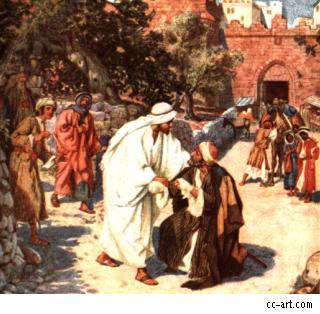The Twelfth Sunday after
Trinity
Ambrose - Chapter One of his Treastise on the Mysteries on the Gospel Lesson
Twelfth Sunday after Trinity
Home
ALMIGHTY and everlasting God, who art always more ready to hear than we to pray, and art wont to give more than either we desire or deserve; Pour down upon us the abundance of thy mercy; forgiving us those things whereof our conscience is afraid, and giving unto us that that our prayer dare not presume to ask, through Jesus Christ our Lord. Amen.
Source of Collect: Leo [460], revised by Gelasius [494]. 2 Corinthians iii. 4
& St. Mark vii. 31
Chapter 1 - Treatise of Ambrose

2 Corinthians iii. 4
SUCH trust have we through Christ to God-ward: not that we are sufficient of ourselves to think any thing as of ourselves; but our sufficiency is of God; who also hath made us able ministers of the new testament; not of the letter, but of the spirit: for the letter killeth, but the spirit giveth life. But if the ministration of death, written and engraven in stones, was glorious, so that the children of Israel could not stedfastly behold the face of Moses for the glory of his countenance; which glory was to be done away: how shall not the ministration of the spirit be rather glorious? For if the ministration of condemnation be glory, much more doth the ministration of righteousness exceed in glory.
St Mark vii. 31
JESUS, departing from the coasts of Tyre and Sidon, came unto the sea of Galilee, through the midst of the coasts of Decapolis. And they bring unto him one that was deaf, and had an impediment in his speech; and they beseech him to put his hand upon him. And he took him aside from the multitude, and put his fingers into his ears, and he spit, and touched his tongue; and looking up to heaven, he sighed, and saith unto him, Ephphatha, that is, Be opened. And straightway his ears were opened, and the string of his tongue was loosed, and he spake plain. And he charged them that they should tell no man: but the more he charged them, so much the more a great deal they published it; and were beyond measure astonished, saying, He hath done all things well: he maketh both the deaf to hear, and the dumb to speak.

Chapter 1. The Book Concerning the Mysteries
St. Ambrose states that after the explanations he has already given of holy living, he will now explain the Mysteries. Then after giving his reasons for not having done so before, he explains the mystery of the opening of the ears, and shows how this was of old done by Christ Himself.
1. We have spoken daily upon subjects connected with morals, when the deeds of the Patriarchs or the precepts of the Proverbs were being read, in order that being taught and instructed by these you might grow accustomed to enter the ways of the ancients and to walk in their paths, and obey the divine commands; in order that being renewed by baptism you might hold to that manner of life which beseems those who are washed.
2. The season now warns us to speak of the Mysteries, and to set forth the purport of the sacraments, which if we had thought it well to teach before baptism to those who were not yet initiated, we should be considered rather to have betrayed than to have portrayed the Mysteries. And then, too, another reason is that the light itself of the Mysteries will shed itself with more effect upon those who are expecting they know not what, than if any discourse had come beforehand.
3. Open, then, your ears, inhale the good savour of eternal life which has been breathed upon you by the grace of the sacraments; which was signified to you by us, when, celebrating the mystery of the opening, we said, “Epphatha, which is, Be opened,” that whosoever was coming in quest of peace might know what he was asked, and be bound to remember what he answered.
4. Christ made use of this mystery in the Gospel, as we read, when He healed him who was deaf and dumb. But He touched the mouth, because he who was healed was dumb and was a man, as regards one point that he might open his mouth with the sound of the voice given to him; as regards the other point because that touch was seemly towards a man, but would have been unseemly towards a woman.
Read the entire treatise
HOME